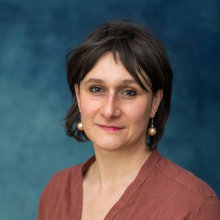What do you teach at Ca’ Foscari? What are your main research interests?
My name is Elisa Bordin and I live in Mirano, in the province of Venice. I teach History of North American Culture, Anglo-American Literature and American Cultural Studies. I mainly focus on the literature of "fringes", differently understood as ethnic and/or race studies, in a national or cross-national perspective. I worked on the western and masculinity, on the memory of slavery and the image of race, on the Italian-American writer John Fante. I am currently working on the literary production of the new African community in the United States and, specifically, a monograph (co-written with A. Oboe) on the "global Igbo" writer Chris Abani is being printed.
Tell us about your academic path.
I graduated from the University of Padua in Anglo-American Literature; for my PhD I moved to the University of Verona, where I spent a semester at the University of Arizona, Tucson. Also in Verona, I continued with a research fellowship; at the University of Trieste, I taught Anglo-American Literature for a few years, before returning to the University of Padua as a Postdoc Fellow for three years and eventually arriving at Ca' Foscari.
What are your professional role models / references?
Having studied and worked in several universities and being part of several editorial boards of academic journals, there are many senior colleagues who have marked my background. Forgetting to name some of them would be embarrassing, but certainly many are women. As a mother of two, listening to the stories of the generation of academics before mine, their difficulties but also their ability to maintain a balance between academic and private life and the effort to build an increasingly ethical university, has been illuminating over the years.
Have you always known that this was going to be your path?
When I was very young, as a kid, I was very intrigued by certain narratives and asked myself questions to which, I realise, I was able to give answers through my research. However, I would not speak of "path", but rather of a continuous desire to ask myself questions, and of research as a space where I can look for answers.
What is the aspect of your research you are most passionate about?
The ethical aspect; portability in everyday life.
What does teaching and researching mean to you?
I am very grateful to my students, because I am lucky enough to speak to an audience that is always interested, attentive and gives its time to my words. The contents of research do not always find their way into courses - research is by definition avant-garde, it tries to push the limits of knowledge, whereas courses are designed on a gradual basis. Nevertheless, what I try to get across in any course is how to make our questions and analyses critical, whether it is the latest Tarantino film or a 17th-century text.
What has given you the greatest satisfaction in your career?
Time spent abroad is always significant; whether for research or conferences, and therefore for longer or shorter periods, the experience of talking to others, in professional terms, is always the greatest satisfaction. These are times when you realise that you are part of a community, of a fluid but shared and extended knowledge.
The area you have always wanted to be involved in but have not yet had the opportunity to explore?
In the past, I have worked on Visual Studies in relation to Critical Race Studies. I would like to explore the visual aspect and its expression on bodies in motion, from a cross-national and historical perspective.
What would you say to young people starting their university career?
That there is always room for thought and discussion.
Why Ca’ Foscari and Venice?
Ca' Foscari accepted me as part of their Project of Excellence, specifically in its literary and cultural aspect linked to the study of cultural identity and mixes, which originated from the more or less new migratory contacts in America.

